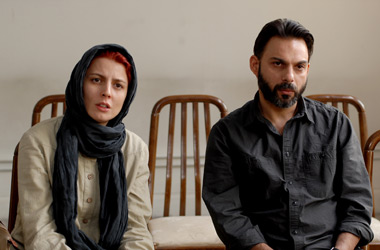There can be few things sadder in life than the dissolution of a marriage. Even in the best of circumstances—when everyone involved is in agreement, and nobody thinks it’s the wrong thing to do—it remains the end of something that, almost by definition, began as a more joyous and hopeful thing. At the beginning, we look ahead at the unknown happiness; when it ends, it’s hard not to look back over the ruins and wonder where it all went wrong.
In Iranian director Asghar Farhadi’s film A Separation (nominated this year for an Academy Award for Best Foreign Film), that break is just the beginning. The story of a family torn apart by paternal loyalty and religious strictures, it shines a light on a tale that will be both familiar and new to American audiences accustomed to a more secular style of separation.
Nader and Simin are an upper middle-class husband and wife who live with their young daughter Termeh in modern day Tehran. Simin, who hopes to raise her daughter out of the country, is at odds with her husband, who refuses to leave because doing so would mean abandoning his elderly, Alzheimer’s-afflicted father. At an impasse, Simin begins divorce proceedings only to have the court find that the couple’s marital problems are not serious enough to call for a divorce. Feeling unable to continue in her present situation, she decides to move in with her parents.
From there, each attempt at lessening someone’s pain only seems to add to it. On Simin’s advice, Nader takes on Razieh as a caregiver for his father. Pregnant and devout—she consults a religious hotline to ask if cleaning her incontinent charge is a sin—she has nonetheless taken the job without the knowledge of her quick-tempered husband Houjat, whose debt has forced his wife to look for work. Unprepared for the task, she is soon overwhelmed. When a misunderstanding leads to a dismissal, and the dismissal to an argument, the argument leads to more sorrow still, and an event that threatens to keep Nader in prison for years to come.
Through it all, of course, the one person who sees everything is the child at the center of it all: Termeh. And as the film ends, the family’s youngest member is asked to make one of the group’s most heart-wrenching and long-lasting choices.
Also this week: Two special screenings come to the area, each political in its own way. First up is Cloudburst, making its New England premiere on Saturday night as part of the Out! For Reel LGBT Film Series screening at Northampton’s Academy of Music. Academy Award winner Olympia Dukakis (Moonstruck) stars as Stella, one half of a longtime lesbian couple eloping to Canada (and escaping a nursing home in the process) before family members can separate them. Directed by Thom Fitzgerald, it’s a story that reads like the ending so many wished Thelma & Louise could have had. After the film, the presenters will host an after-party at the Hotel Northampton’s Grand Ballroom, where the celebration will go on until midnight.
And on Wednesday night at UMass, the film Granito: How To Nail A Dictator will be screened at the Isenberg School of Management. Director and UMass alum Pamela Yates will be present to discuss her film, which explores the genocide of nearly 200,000 Maya people. The film’s title refers to the single grain of sand that each witness to the atrocity is said to have added to the story’s telling.
Jack Brown can be reached at cinemadope@gmail.com.



